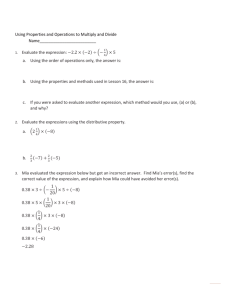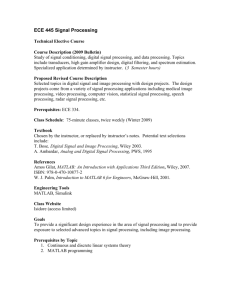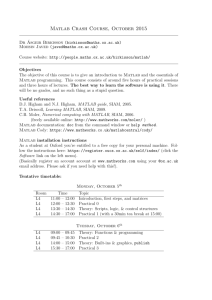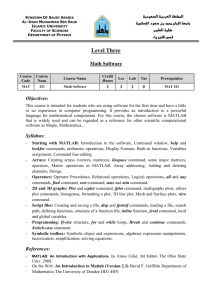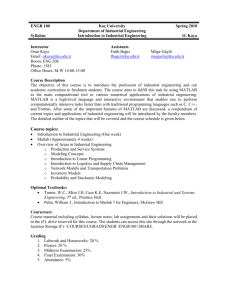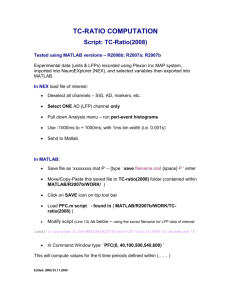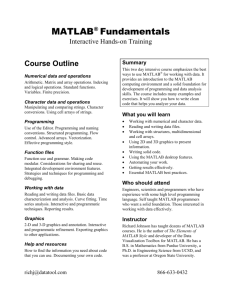C. Kelly - Wayne State University Physics and Astronomy
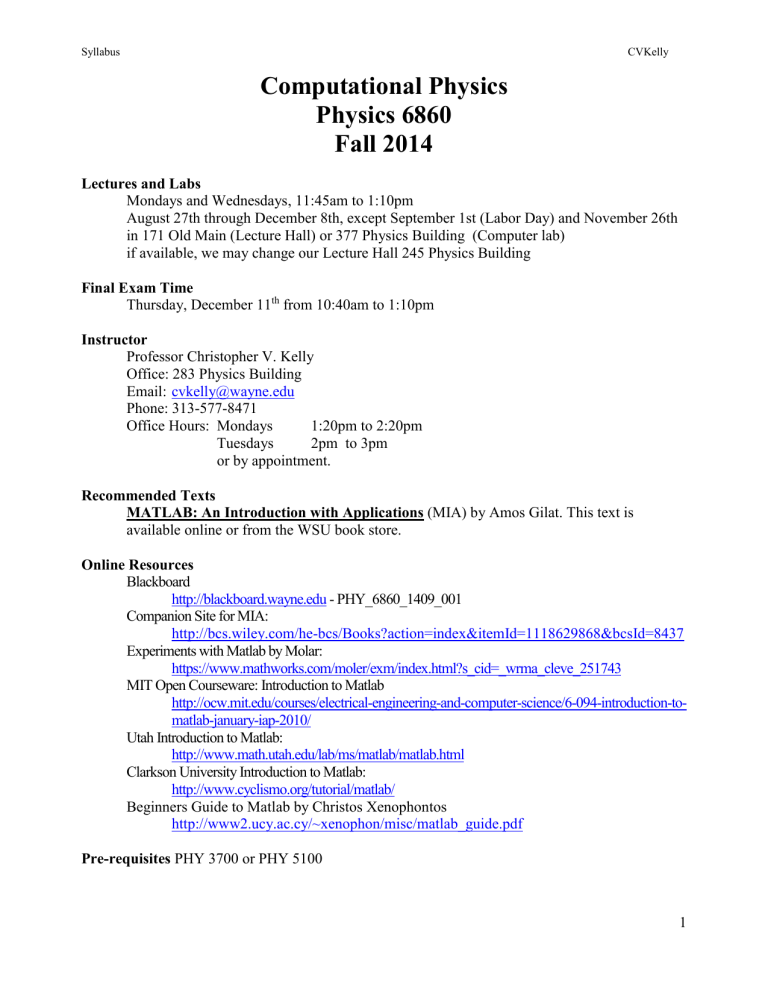
Syllabus CVKelly
Computational Physics
Physics 6860
Fall 2014
Lectures and Labs
Mondays and Wednesdays, 11:45am to 1:10pm
August 27th through December 8th, except September 1st (Labor Day) and November 26th in 171 Old Main (Lecture Hall) or 377 Physics Building (Computer lab) if available, we may change our Lecture Hall 245 Physics Building
Final Exam Time
Thursday, December 11 th
from 10:40am to 1:10pm
Instructor
Professor Christopher V. Kelly
Office: 283 Physics Building
Email: cvkelly@wayne.edu
Phone: 313-577-8471
Office Hours: Mondays 1:20pm to 2:20pm
Tuesdays 2pm to 3pm or by appointment.
Recommended Texts
MATLAB: An Introduction with Applications (MIA) by Amos Gilat. This text is available online or from the WSU book store.
Online Resources
Blackboard http://blackboard.wayne.edu
- PHY_6860_1409_001
Companion Site for MIA: http://bcs.wiley.com/he-bcs/Books?action=index&itemId=1118629868&bcsId=8437
Experiments with Matlab by Molar: https://www.mathworks.com/moler/exm/index.html?s_cid=_wrma_cleve_251743
MIT Open Courseware: Introduction to Matlab http://ocw.mit.edu/courses/electrical-engineering-and-computer-science/6-094-introduction-tomatlab-january-iap-2010/
Utah Introduction to Matlab: http://www.math.utah.edu/lab/ms/matlab/matlab.html
Clarkson University Introduction to Matlab: http://www.cyclismo.org/tutorial/matlab/
Beginners Guide to Matlab by Christos Xenophontos http://www2.ucy.ac.cy/~xenophon/misc/matlab_guide.pdf
Pre-requisites PHY 3700 or PHY 5100
1
Syllabus
Software
CVKelly
We'll be using MATLAB (The MathWorks, Inc.) almost exclusively throughout this course.
This software is available to you in the Physics Computer Lab (377 Physics) from 8:30am to 5pm on work days via a key from the Physics Department office. You may choose to buy a student copy of MATLAB for your personal computer. The basic software costs $50 and we'll occasionally use the Image Processing Toolkit and the Curve Fitting Toolkit, which cost $30 extra each from https://www.mathworks.com/store/link/products/student/new?s_iid=htb_buy_gtwy_cta3 . If you're going to buy a copy of MATLAB, I would wait to buy the toolkits until you need them.
Add/Drop Dates
Please refer to WSU's Academic and Registration Calendar 2014-2015 (http://reg. wayne.edu/students/calendar14-15.php) for the University's add and drop dates. Note: failing to drop a class by a deadline may hurt your GPA, financial aid status, and/or your tuition bill.
How to be successful in this course
The key to being successful in this course is to engage at all levels. Read the relevant sections of the text before lectures/labs, be attentive during lectures, be a leader during labs, ask questions, learn from your mistakes on homework, quizzes, and exams, and follow up during office hours. Students who display a strong desire to thrive will display their efforts via detailed questions from the readings or assignments that reflect their individual effort to understand the subject matter.
Utilize the numerous resources available to you and recognize that success in this course will not be achieved solely through passive observation of the lectures and labs.
Course Content
This course will introduce the principles of computer programming with MATLAB. We will roughly follow the content in MIA but there will be opportunities for independent projects of topics that interest you individually.
Learning Objectives
1) Demonstrate a conceptual understanding of computer programming.
2) Demonstrate competence in MATLAB programming.
3) Demonstrate the capability to learn new programming skills through independent use of help menus and online resources.
Final Grades
Final grades will be calculated from 20% Participation, 30%
Homework, 20% Midterm Project and Presentation, and 30% Final
Project and Presentation. Final grades may be rescaled to increase the average student's grade, however the minimum letter grade to be awarded based on final percentages are shown in this chart:
Exams
There will be no exams in this course.
Homework
Final
Cumulative
Work
90%
80%
70%
60%
Minimum
Letter
Grade
A-
B-
C-
D-
Homework will be assigned and submitted on a weekly basis. Usually, homework will require the writing and submission of working MATLAB code. Code should be submitted as a
"published" PDF file ( http://www.mathworks.com/help/matlab/matlab_prog/publishing-matlab-
2
Syllabus CVKelly code.html
). Published PDF files of your executed code should be submitted via Blackboard
( https://www.youtube.com/watch?v=nZu0J9i7F3Q ). Homework may
Students are encouraged to work together on the homework via small study groups.
However, each student is required to write their own answers without copying or plagiarizing others. Your homework is expected to be a reflection of your effort and your understanding. Any copying or plagiarizing will be considered cheating, result in no credit, and possibly university-level disciplinary actions. ( http://www.otl.wayne.edu/wsu_integrity.php
)
Participation
Your participation in all activities of the course will help you and other students learn the material. Participation points will be given for pre-class surveys, in-class activities, and out-of-class study-group participation. Frequently in this course, students will be offered the chance to explain how they achieved a programming feat. Participation points may count for up to 20% of your final grade in 5340. Attendance will not be regularly taken, but the repeated absence will surely decrease your in-class participation grade.
Should your participation in class prove to be distracting or disruptive, you may be asked to leave for the day and come to the lecturer’s office hours to discuss the situation.
Projects and Presentations
Midterm and final presentations will be required by each student with an individual topic.
Topics may come from your out-of-class research projects and/or your personal interest. Each project will require an sophisticated use of MATLAB to achieve something that would be nearimpossible to do without computer programming.
Class time has been set aside to allow for each student to present their project to the rest of the class. Each presentation should describe the big picture and purpose of the project, psuedo-code outline followed, a few of the particularly advanced concepts used in your code, and the working code.
Missed Deadlines
It is important to turn in all assignments in a timely manner and your grade will suffer if
Days Late Reduction in
Homework
Reduction in
Project Grade you fail to do so. However, I want to support your learning while recognizing that life can be complex. For this reason, homework and project grades will be decreased depending on how late the assignments are turned in, as shown in this
1
≤7
>7
Grade
15%
30%
50% or 100%
30%
50% or 100%
50% or 100% table. Exceptions can be made on a case-by-case basis, but only with pre-approval from the instructor.
Incompletes
The mark of I—Incomplete, is given to either an undergraduate or a graduate student when he/she has not completed all of the course work as planned for the term and when there is, in the judgment of the instructor, a reasonable probability that the student can complete the course successfully without again attending regular class sessions. The student should be passing at the time the grade of ‘I’ is given. A written contract specifying the work to be completed should be signed by the student and instructor. Responsibility for completing all course work rests with the student ( 2011-2013 WSU Undergraduate Bulletin , 41).
3
Syllabus
Undergraduate vs. Graduate Students
CVKelly
University regulations require that the course work and grading be independent for the undergraduate and graduate students. Graduate students will be assigned longer homework assignments, expected to execute more complex projects, and be expected to be more involved in participating in the course. For example, graduate students are expected to be extra outgoing in helping others error check their code.
Students with Disabilities
If you have a documented disability that requires accommodations, you will need to register with Student Disability Services for coordination of your academic accommodations. The Student
Disability Services (SDS) office is located in the Adamany Undergraduate Library. SDS telephone number is 313-577-1851 or 313-577-3365 (TTD only). Once you have your accommodations in place, I will be glad to meet with you privately during my office hours or at another agreed upon time to discuss your needs. Student Disability Services' mission is to assist the university in creating an accessible community where students with disabilities have an equal opportunity to fully participate in their educational experience at Wayne State University. Also see: http://studentdisability.wayne.edu
Syllabus Modifications
I will be trying a number of teaching techniques throughout this semester, some of which are described in this syllabus. As I learn what is working and what is not, I will be modifying the policies of this course. And so, this syllabus is a dynamic document that may be updated as the semester progresses.
Academic Misconduct
Academic misbehavior means any activity that tends to compromise the academic integrity of the institution or subvert the education process. All forms of academic misbehavior are prohibited at Wayne State University, as outlined in the Student Code of Conduct
( http://doso.wayne.edu/codeofconduct.pdf
). Students who commit or assist in committing dishonest acts are subject to downgrading (to a failing grade for the test, paper, or other course-related activity in question, or for the entire course) and/or additional sanctions as described in the Student Code of
Conduct. Cheating: Intentionally using or attempting to use, or intentionally providing or attempting to provide, unauthorized materials, information or assistance in any academic exercise.
Examples include: (a) copying from another student’s test paper; (b) allowing another student to copy from a test paper; (c) using unauthorized material such as a "cheat sheet" during an exam. (d) unauthorized access to a test from a previous semester also constitutes cheating. Fabrication:
Intentional and unauthorized falsification of any information or citation. Examples include: (a) citation of information not taken from the source indicated; (b) listing sources in a bibliography not used in a research paper. Plagiarism: To take and use another’s words or ideas as one’s own.
Examples include: (a) failure to use appropriate referencing when using the words or ideas of other persons. (b) altering the language, paraphrasing, omitting, rearranging, or forming new combinations of words in an attempt to make the thoughts of another appear as your own. Other forms of academic misbehavior include, but are not limited to: (a) unauthorized use of resources, or any attempt to limit another student’s access to educational resources, or any attempt to alter equipment so as to lead to an incorrect answer for subsequent users; (b) enlisting the assistance of a
4
Syllabus CVKelly substitute in the taking of examinations; (c) violating course rules as defined in the course syllabus or other written information provided to the student; (d) selling, buying or stealing all or part of an un-administered test or answers to the test; (e) changing or altering a grade on a test or other academic grade records.
WSU Resources for Students
Student Disability Services (SDS) http://studentdisability.wayne.edu/
Academic Success Center http://www.success.wayne.edu/
Counseling and Psychological Services (CAPS) http://www.caps.wayne.edu
Dean of Students’ Office http://www.doso.wayne.edu
College of Liberal Arts & Sciences: http://clasweb.clas.wayne.edu/CurrentStudents
Departmental Website: http://physics.clas.wayne.edu/ /
Tentative Lecture Schedule
Week Date
1
Topics and Activities
8/27 W Basic Calculations
Readings
MIA Ch1
2
3
4
9/3
9/8
W Basic Arrays - HW1 Due
M Math with Arrays
9/10 W HW2 Due
9/15 M Importing and exporting data
MIA Ch2
MIA Ch3
MIA Ch4
5
9/17 W HW3 Due
9/22 M Plotting
9/24 W HW4 Due
9/29 M Conditional Statements and Loops 6
7
8
9
10/1 W HW5 Due
10/6 M User defined functions
10/8 W Prepare for midterm presentations
10/13
10/15
10/20
10/22
M
W
MIDTERM PRESENTATIONS
MIDTERM PRESENTATIONS
M Curve fitting and interpolation
W HW6 Due
10 10/27 M Numerical Analysis
10/29 W HW7 Due
11 11/3 M 3D plots
11/5 W HW8 Due
12 11/10 M Image analysis
11/12 W HW9 Due
13 11/17 M Advanced image analysis
11/19 W HW10 Due
14 11/24 M Prepare for final presentations
15
16
12/1 M Prepare for final presentations
12/3 W Prepare for final presentations
12/8 M FINAL PRESENTATIONS
FINAL PRESENTATIONS – 10:40pm -
12/11 R
1:10pm
This schedule is subject to change.
MIA Ch5
MIA Ch6
MIA Ch7
MIA Ch8
MIA Ch9
MIA Ch10
5
